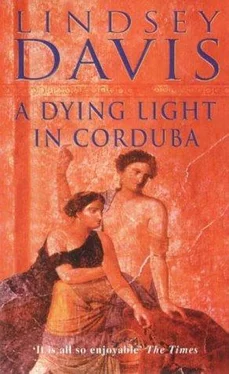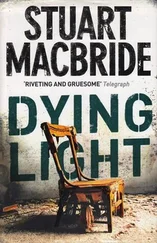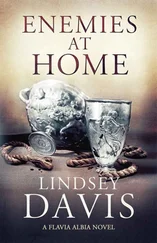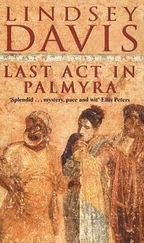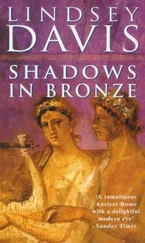Lindsey Davis - A dying light in Corduba
Здесь есть возможность читать онлайн «Lindsey Davis - A dying light in Corduba» весь текст электронной книги совершенно бесплатно (целиком полную версию без сокращений). В некоторых случаях можно слушать аудио, скачать через торрент в формате fb2 и присутствует краткое содержание. Жанр: Исторический детектив, на английском языке. Описание произведения, (предисловие) а так же отзывы посетителей доступны на портале библиотеки ЛибКат.
- Название:A dying light in Corduba
- Автор:
- Жанр:
- Год:неизвестен
- ISBN:нет данных
- Рейтинг книги:3.5 / 5. Голосов: 2
-
Избранное:Добавить в избранное
- Отзывы:
-
Ваша оценка:
- 80
- 1
- 2
- 3
- 4
- 5
A dying light in Corduba: краткое содержание, описание и аннотация
Предлагаем к чтению аннотацию, описание, краткое содержание или предисловие (зависит от того, что написал сам автор книги «A dying light in Corduba»). Если вы не нашли необходимую информацию о книге — напишите в комментариях, мы постараемся отыскать её.
A dying light in Corduba — читать онлайн бесплатно полную книгу (весь текст) целиком
Ниже представлен текст книги, разбитый по страницам. Система сохранения места последней прочитанной страницы, позволяет с удобством читать онлайн бесплатно книгу «A dying light in Corduba», без необходимости каждый раз заново искать на чём Вы остановились. Поставьте закладку, и сможете в любой момент перейти на страницу, на которой закончили чтение.
Интервал:
Закладка:
Optatus and I were the eldest men there. At least ten years separated the Annaeus sons. Primus, the eldest, might be almost our age, but his youngest brother was not yet twenty, and Fortune had arranged it that he was the one with the most friends. This largest group coalesced first, though all they did was to mill around trying to find food, drink or sinful women; they were stuck with the stuff in cups and bowls because they did not know how to recognise the other. We worried them. (They worried me.) We belonged to a wholly different generation. They all slipped by us, avoiding contact, because they thought we were somebody's parental police.
A second party had developed in the cellar, to which friends of Dotty, the middle son, zoomed with a sense of purpose which would quickly leave them. They despised food, and had probably tried women, but were all betrothed to sweet, virginal girls (who were currently behind bushes with other young men). Suspicions that they were being deceived, and that life would only bring them more of the same, made the middle son's cronies a brooding, cynical group. Optatus and I exchanged a few witty thoughts with them, before we moved on.
Spunky, who would be known to posterity and the Censor as the honourable Lucius Annaeus Maximus Primus, was pretending to be grown up. He had retreated from the noise and debauchery to his father's elegant library. It was a quiet upper room with a splendid balcony which gave views across the ornate gardens. There he and a few jaded companions were pulling scrolls from their pigeonholes, examining them satirically, then tossing them into a heap on the floor. An amphora had made a vicious ring on a marble side table. Another had been knocked over after uncorking, so some spirited soul had pulled down a curtain to mop up the mess. How thoughtful. I was pleased to see they were not all bad.
Optatus told me that this Annaeus, unlike his two younger brothers, was actually married, though to a girl so young she remained with her parents while he simply enjoyed the income from her dowry and pretended he was still safe from responsibility. He was a plump-faced, solidly built young Baetican, whose amiable nature made him instantly forgive me for being the man he and his brothers had shoved about (twice) the last time I visited their palatial home. He greeted Optatus like a lost lamb. Optatus seemed genuinely friendly towards him.
Rufius Constans, though rather young for this group, had already made his way here. I thought he coloured up when I first walked through the door, and after I found myself a place to squat he seemed to edge away as far as possible. Wine was being splashed around at that point, so maybe he just wanted to avoid the spillage. Slaves were serving, but they looked extremely nervous. When the guests wanted more, they bawled for it loudly; if nobody came soon enough they grabbed the jugs for themselves, deliberately missing their cups when they poured.
I had been among this type before. It was a long time since I had found them amusing. I knew what to expect. They would sit around for hours, getting pointlessly drunk. Their conversation would consist of bloody-minded politics, coarse abuse of women, boasting about their chariots, then making exaggerated assessments of their wealth and the size of their pricks. Their brains were no bigger than chickpeas, that's for sure. I won't speculate on the rest.
Several scions from other families were among this group. They were introduced to me at the time, though I reckoned there was no real need to remember them. These would be the chubby heirs to all the fine folk Helena and I had seen at the parilia, the tight little section of snobs who ran everything in Corduba. One day these would be the snobs themselves. There would come a time for most of them when a father would die, or they married, or a close friend was killed very young; then they would move silently from being crass young idiots to being the spit image of their staid fathers.
'Bollocks!' muttered a voice beside me in the chaos.
I had thought I was next to Optatus, but when I turned it was another who had joined us without introductions. I knew who he was. I had seen him here before, collecting Aelia Annaea, and since then I had learned that he was Quinctius Quadratus.
At close quarters familial resemblance to his father was clear. He had a thick thatch of black crinkled hair, muscular arms, and a lordly expression. He was tanned, hirsute and strong-featured. Sporting and popular. possessed of ease and happy arrogance. He wore a white tunic with broad purple stripes and had even put on his scarlet boots, things I had rarely seen in Rome: he was a senator-elect, and new enough to want to be seen in every detail of the historic uniform. I was looking at the recently appointed financial controller of Baetica. Even though the proconsul was unhappy with his assignment here, Quadratus himself was flaunting it. So I already knew one thing: he had no official tact.
The cause of his exclamation was not a spot of mind- reading, but an uncouth response to a scroll which he had plucked from the library columbarium. I couldn't read the title. He sneered, rolled it up very tightly, then stuffed it into the neck of an empty wine vessel like a plug.
'Well, well,' I said. 'They told me you were charming and gifted, but not that your talents extended to instant crits of literature.'
'I can read,' he answered lazily. 'I say, I don't believe we've met?'
I viewed him benignly. 'The name's Falco. And of course I know who you are, quaestor.'
'There's no need to be formal,' he assured me in his charming way.
'Thanks,' I said.
'Have you come out from Rome?'
'That's right,' I replied for the second time that night. 'We nearly bumped into each other there recently, but I hear you were at the theatre instead. The last dinner for the Society of Baetican Olive Oil Producers?'
'Oh, them!' he replied offhandedly.
'What was the play? Any good?'
'A farce, I think.' Rufius Constans had pretended it was a mime. 'So-so.' Or not. He paused. He knew what I was doing here. 'Is this an interview?'
'Great gods, no,' I laughed, reaching for more wine. 'I'm – bloody well off duty tonight, if you don't mind!'
'That's good,' smiled Tiberius Quinctius Quadratus, quaestor of Baetica. He was off duty too, of course. The proconsul had arranged that.
XXXVII
The room was squashed, and noisy with brash young idiots' chatter. What was more, they were about to amuse themselves playing the ancient Greek game of kottabos. Spunky, who would have made a good crony for the Athenian reprobate Alcibiades, had been given the apparatus for his birthday – an aptly chosen gift from his younger brothers. Clearly nobody had told him that kottabos explains why the Greeks no longer rule the world.
For refined readers of this memoir who will certainly never encounter it, kottabos was invented by a group of uproarious drunks. You have a tall stand, with a large bronze disc suspended horizontally halfway up. A small metal target is balanced on the top of the stand. The players drink their wine, then flick their cups to expel the dregs. They aim to make the flying lees hit the target so it falls off and hits the lower disc with a noise like a bell. All the wine they flick splatters the room and themselves.
That's it a little gem from the wise, wonderful people who invented the classic proportions of sculpture and the tenets of moral philosophy.
By mutual consent Quadratus and I took wine and cups to drink it from, then we moved out smartly to the balcony. We were the mature ones here. We were men of the world. Well, he was a Roman official, and I was a man of the world. So we drew apart to give ourselves space to spread a bit. (It's hard to fulfil your potential as a man of the world when your knees are jammed under a readmg couch and a murex-merchant's nephew has just belched in your ear.) Optatus, who was talking earnestly to young Constans, raised his winecup wryly as I stepped over him, following my smart new pal.
Читать дальшеИнтервал:
Закладка:
Похожие книги на «A dying light in Corduba»
Представляем Вашему вниманию похожие книги на «A dying light in Corduba» списком для выбора. Мы отобрали схожую по названию и смыслу литературу в надежде предоставить читателям больше вариантов отыскать новые, интересные, ещё непрочитанные произведения.
Обсуждение, отзывы о книге «A dying light in Corduba» и просто собственные мнения читателей. Оставьте ваши комментарии, напишите, что Вы думаете о произведении, его смысле или главных героях. Укажите что конкретно понравилось, а что нет, и почему Вы так считаете.
